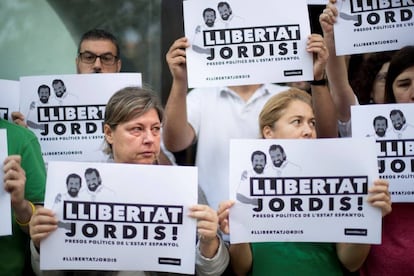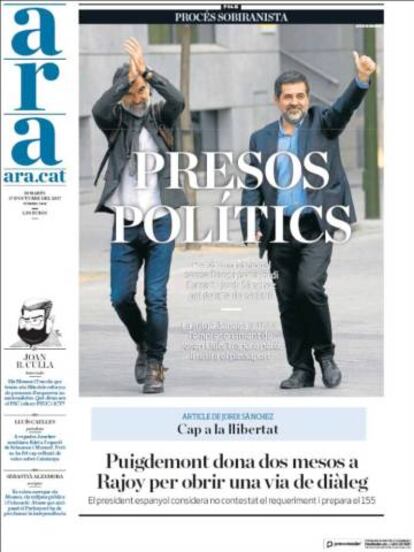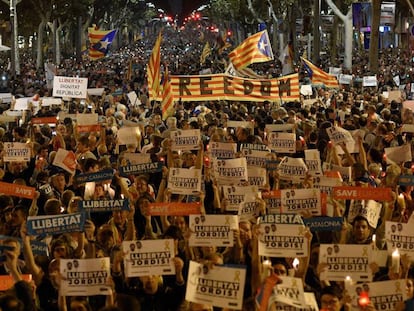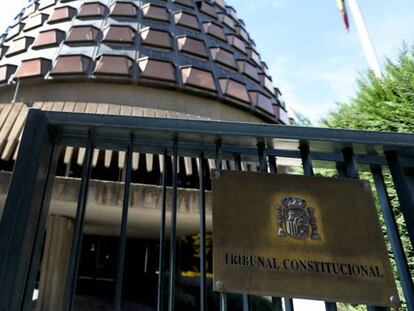The ¡°Jordis¡± are not political prisoners ¨C here¡¯s why
Leaders of ANC and ?mnium Cultural were not taken into custody for their ideas but for alleged sedition
Jordi S¨¤nchez and Jordi Cuixart, the leaders of National Catalan Assembly (ANC) and ?mnium, the main civic groups behind Catalonia¡¯s pro-independence street mobilizations, were taken into custody without bail on Monday while a judge investigates charges of sedition against them.

They are accused of directing and spurring on crowds to stage street protests on September 20 and 21 in a bid ¨C that ultimately failed ¨C to stop Operation Anubis, a raid against the organizers of the illegal independence referendum of October 1.
Podemos leader Pablo Iglesias, several groups within the Barcelona city council, and the pro-independence Catalan newspaper Ara, among others, have criticized the detention and described S¨¤nchez and Cuixart as ¡°political prisoners.¡±
Cuixart and S¨¤nchez have not been jailed for their ideas, but for a felony listed on the Criminal Code of an advanced democracy
¡°They weren¡¯t sent to jail for stealing, but for organizing a peaceful protest,¡± said Iglesias.
So are Jordi S¨¤nchez and Jordi Cuixart political prisoners?
There is no universally accepted definition of ¡°political prisoner,¡± although it could be described as a person who is arrested for his or her political activities, especially if these are critical of, or show opposition to, the government.
In October 2012, for the first time, an international body called the Parliamentary Assembly of the Council of Europe (PACE), approved a list of criteria to be used in defining who is a political prisoner.
According to PACE, these criteria are: ¡°If the detention has been imposed in violation of one of the fundamental guarantees set out in the European Convention on Human Rights and its Protocols (ECHR), in particular freedom of thought, conscience and religion, freedom of expression and information, freedom of assembly and association; if the detention has been imposed for purely political reasons without connection to any offense; if, for political motives, the length of the detention or its conditions are clearly out of proportion to the offense the person has been found guilty of or is suspected of; if, for political motives, he or she is detained in a discriminatory manner as compared to other persons; or, if the detention is the result of proceedings which were clearly unfair and this appears to be connected with political motives of the authorities.¡±
Hechos blog
This article was originally posted on the EL PA?S Hechos (facts) blog, which aims to analyze and pick apart fake news and falsehoods.
These criteria do not apply to S¨¤nchez and Cuixart.
According to the judge¡¯s written decision, both men are ¡°the main instigators and directors of the protests of September 20 and 21.¡±
On September 20, more than 40,000 people heeded the call made by ANC and ?mnium to protest outside the Catalan department of economic affairs over the arrest of 11 government officials over their role in organizing the banned referendum of October 1.
Judge Carmen Lamela argues that these calls were not made to hold peaceful demonstrations, but to ¡°protect¡± the targeted officials and institutions through mass mobilizations at the spots where the Civil Guard was conducting court-ordered searches and arrests.
Judge Lamela notes that on several occasions, it was expressly stated that these demonstrations were meant to ¡°aturar la Guardia Civil¡± (in Catalan, to stop the Civil Guard). A WhatsApp message sent by ?mnium on September 20 at around 8.50am supports this.

The protest outside the economic affairs department was far from peaceful. A court official overseeing the search was forced to leave the building using the rooftop as angry demonstrators vandalized three Civil Guard patrol cars parked outside the door, causing damages estimated at €135,600.
The judge said in her written statement that S¨¤nchez and Cuixart were the instigators of this protest aimed at hindering the work of a law enforcement agency. ¡°Throughout the day, Jordi S¨¤nchez and Jordi Cuixart awarded themselves the role of interlocutors, asserting that they could mobilize the members of the crowd for their own purposes, and trying to negotiate with security forces on at least five occasions [¡] yet never accepting the options that citizen safety experts were proposing to avoid or minimize risk.¡±
So are Jordi S¨¤nchez and Jordi Cuixart political prisoners, then? No. According to the judge¡¯s writ, their actions fall within the scope of sedition, a felony regulated by article 544 of the Criminal Code, and carrying a maximum 15-year prison sentence for those who ¡°publicly and tumultuously rise up to prevent, by force or outside the legal channels, application of the law, or any authority, official corporation or public officer from the lawful exercise of their duties, or implementation of administrative or judicial resolutions.¡±
Cuixart and S¨¤nchez have not been jailed for their ideas, but for a felony listed on the Criminal Code of an advanced democracy: such as Spain is.
English version by Susana Urra.
Tu suscripci¨®n se est¨¢ usando en otro dispositivo
?Quieres a?adir otro usuario a tu suscripci¨®n?
Si contin¨²as leyendo en este dispositivo, no se podr¨¢ leer en el otro.
FlechaTu suscripci¨®n se est¨¢ usando en otro dispositivo y solo puedes acceder a EL PA?S desde un dispositivo a la vez.
Si quieres compartir tu cuenta, cambia tu suscripci¨®n a la modalidad Premium, as¨ª podr¨¢s a?adir otro usuario. Cada uno acceder¨¢ con su propia cuenta de email, lo que os permitir¨¢ personalizar vuestra experiencia en EL PA?S.
?Tienes una suscripci¨®n de empresa? Accede aqu¨ª para contratar m¨¢s cuentas.
En el caso de no saber qui¨¦n est¨¢ usando tu cuenta, te recomendamos cambiar tu contrase?a aqu¨ª.
Si decides continuar compartiendo tu cuenta, este mensaje se mostrar¨¢ en tu dispositivo y en el de la otra persona que est¨¢ usando tu cuenta de forma indefinida, afectando a tu experiencia de lectura. Puedes consultar aqu¨ª los t¨¦rminos y condiciones de la suscripci¨®n digital.










































